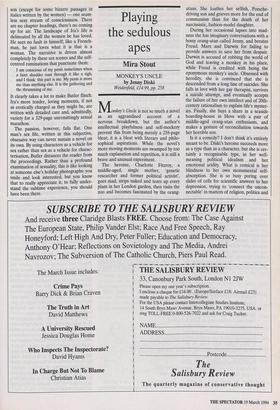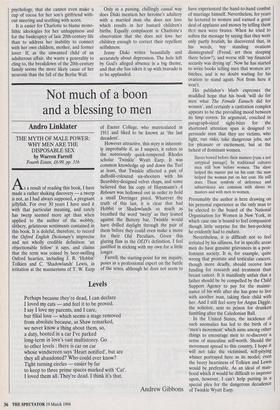Playing the sedulous apes
Mira Stout
MONKEY'S UNCLE by Jenny Diski Weidenfeld, £14.99, pp. 258 Monkey's Uncle is not so much a novel as an aggrandised account of a nervous breakdown, but the author's intellectual playfulness and self-mockery prevent this from being merely a 258-page bleat; it is a bleat with literary and philo- sophical aspirations. While the novel's more moving moments are swamped by too much explanation and repetition, it is still a brave and unusual experiment.
The heroine, Charlotte Fitzroy, a middle-aged, single mother, 'genetic researcher and former political activist', goes mad, strips naked and tears up every plant in her London garden, then visits the zoo and becomes fascinated by the orang- utans. She loathes her selfish, Porsche- driving son and grieves more for the end of communism than for the death of her narcissistic, fashion-model daughter.
During her occasional lapses into mad- ness she has imaginary conversations with a bossy orang-utan called Jenny, and berates Freud, Marx and Darwin for failing to provide answers to save her from despair. Darwin is accused of robbing the world of God and leaving a monkey in his place, while Freud is credited with being the eponymous monkey's uncle. Obsessed with heredity, she is convinced that she is descended from a long line of suicides. She falls in love with her gay therapist, survives a suicide attempt, and eventually accepts the failure of her own intellect and of 20th- century rationalism to explain life's myster- ies. Finally, she buys a share in a seaside boarding-house in Hove with a pair of middle-aged orang-utan enthusiasts, and makes a gesture of reconciliation towards her horrible son.
Is it a comedy? I don't think it's entirely meant to be. Diski's heroine succeeds more as a type than as a character, but she is cer- tainly a recognisable type, in her well- meaning political idealism and her emotional aridity. What is comical is her blindness to her own monumental self- absorption. She is so busy poring over slides of cells for scientific answers to her depression, trying to 'connect the uncon- nectable' in matters of religion, politics and psychology, that she cannot even make a cup of cocoa for her son's girlfriend with- out sneering and seething with scorn.
It is easier for Charlotte to blame mono- lithic ideologies for her unhappiness and for the bankruptcy of late 20th-century life than to address her inability to connect with her own children, mother, and former lover. If, as the unwanted child of an adulterous affair, she wants a generality to cling to, the breakdown of the 20th-century family seems the more likely cause of her neurosis than the fall of the Berlin Wall. Only in a passing, chillingly casual way does Diski mention her heroine's adultery with a married man she does not love which results in her bastard children's births. Equally complacent is Charlotte's observation that she does not love her children enough to correct their repellent selfishness.
Jenny Diski writes beautifully and accurately about depression. The hole left by God's alleged absence is a big theme, and that she has taken it up with bravado is to be applauded.



























































 Previous page
Previous page